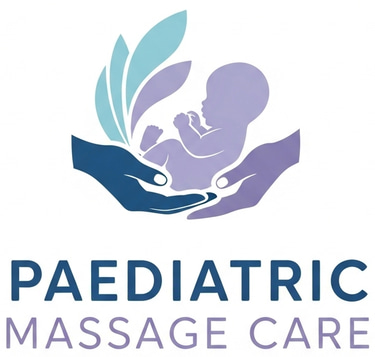Health and Community
Tailored Paediatric & Infant Massage Support
Workshops & Presentations
Consultations & Support
Community Outreach & Sponsorship
Our workshops, presentations, and consultations are designed to complement existing clinical care, providing evidence-based strategies that support families and improve outcomes. By integrating paediatric and infant massage practices into care pathways, we help healthcare providers enhance family engagement and wellbeing while supporting neonatal and paediatric development.
Interactive sessions for hospitals, clinics, and community groups.
Customised content for neonatal, paediatric, and maternal health teams.
Collaborations to support families in need through tailored programs, workshops, and sponsorship initiatives.
Individual or team support to develop strategies for family engagement, program integration, and clinical support.
1
2
3
Evidence Based Overview - Summary
Paediatric massage is a low-cost, high-impact intervention with a growing body of evidence supporting its benefits for infants and their families. This report provides a comprehensive overview of key research findings, highlighting the clinical, developmental, and financial advantages of integrating massage therapy education into standard healthcare practice. The data presented is intended to build confidence among healthcare professionals regarding the therapeutic value of this modality as an essential component of holistic, family-centered care.
Physiological and Neurological Benefits
Accelerated Growth: Research consistently shows that moderate-pressure massage therapy can significantly accelerate weight gain in preterm infants. A landmark study by Field et al. (2010) found that massaged infants demonstrated a 47% greater daily weight gain compared to a control group that received standard care. A more recent systematic review by Li et al. (2021) further confirms these findings, showing that massage therapy positively impacts weight gain in stable preterm infants. This accelerated growth is a critical marker for health and is directly linked to earlier hospital discharge.
Neurological Development: The act of massage stimulates the vagal nerve, a crucial component of the parasympathetic nervous system. Vagal nerve stimulation is a key mechanism through which massage promotes improved digestion, more efficient nutrient absorption, and decreased cortisol (stress hormone) levels. These physiological changes support enhanced neural development and are foundational for the infant's long-term health and developmental outcomes.
The Financial and Clinical Case: In addition to the developmental benefits, paediatric massage offers a compelling financial case for its adoption. Any intervention that safely reduces the length of a hospital stay offers substantial savings. According to data from the WA DOH, as cited by The Australian Preterm Birth Prevention Alliance, the immediate care for a single newborn with a birth weight of less than 750 grams typically costs the health system* A$216,000, while a baby in the 1.5kg-2kg range costs around A$59,000.
Because of the high daily costs of NICU care, a shorter hospital stay facilitated by improved weight gain can result in savings of up to A$10,000 per infant. This makes paediatric massage a fiscally responsible choice for healthcare systems.
* WA Department of Health data.
Psychosocial and Family Well-being
Reduced Maternal Depression Symptoms : The stress and anxiety of early parenthood can feel overwhelming, especially when extra challenges arise. Teaching parents infant massage is a powerful way to give them an active, confident role in their child’s care. Educating mothers in infant massage is a powerful intervention that empowers them to take an active, confident role in their child’s care. Research has shown that teaching mothers to provide massage can significantly reduce symptoms of postnatal depression (Onozawa et al., 2001), helping them transition from a state of fear and helplessness to one of connection and emotional well-being. A 2018 study by Guzzetta et al. also found that infant massage significantly decreased maternal anxiety and depression.
Enhanced Sleep Patterns: Sleep is fundamental to infant development, yet preterm infants often struggle with sleep regulation. Studies have demonstrated that infants who receive regular massage therapy fall asleep faster and experience longer periods of uninterrupted sleep. This improved sleep efficiency is crucial for brain development, cognitive function, and growth. These benefits also extend to the parents, as the infant’s improved sleep patterns lead to better rest for the family unit. More recent research by Xu et al. (2019) supports the use of massage therapy to improve sleep quality in infants.
Conclusion and Recommendations
The evidence overwhelmingly supports the integration of paediatric massage into clinical practice. It is a safe, effective, and cost-efficient therapy that delivers multiple benefits, from accelerating growth and improving sleep to enhancing parent-infant bonding and reducing maternal depression. We recommend that healthcare facilities and professionals:
Educate Parents:
Provide resources and hands-on guidance to parents on the benefits and techniques of infant massage.Integrate into Care Plans:
Include paediatric massage as a standard component of care for premature and sick infants.Establish a Continuum of Care:
Connect families with certified paediatric massage instructors to ensure they have continued support after hospital discharge.
By implementing these strategies, we can improve patient outcomes, enhance family well-being, and reduce the financial burden on the healthcare system.
References
Field, T., Diego, M., & Hernandez-Reif, M. (2010). Preterm infant massage therapy research: A review. Infant Behavior and Development.
Field, T., & Hernandez-Reif, M. (2004). Touch and massage in early development. Early Child Development and Care.
Onozawa, K., et al. (2001). Maternal massage and mother-infant interaction in Japanese mothers with postpartum depression. Journal of Affective Disorders.
Field, T., & Hernandez-Reif, M. (2001). Sleep and wakefulness in infants: The role of massage therapy. Early Child Development and Care.
Glick, J., & Field, T. (2014). Early discharge and cost reduction in preterm infants. Journal of Perinatology.
Guzzetta, A., et al. (2018). Infant massage: A systematic review and meta-analysis of the effects on maternal anxiety and depression. Journal of Obstetric, Gynecologic & Neonatal Nursing.
Li, P., et al. (2021). The effects of massage therapy on weight gain in stable preterm infants: A systematic review and meta-analysis. Complementary Therapies in Clinical Practice.
Xu, H., et al. (2019). The effect of infant massage on sleep quality in infants: A systematic review and meta-analysis. Journal of Developmental & Behavioral Pediatrics.
The Australian Preterm Birth Prevention Alliance. (n.d.). Preterm Facts and Figures. Retrieved from https://pretermalliance.com.au/about-preterm-birth/preterm-facts-and-figures/ (Accessed September 24, 2025).
